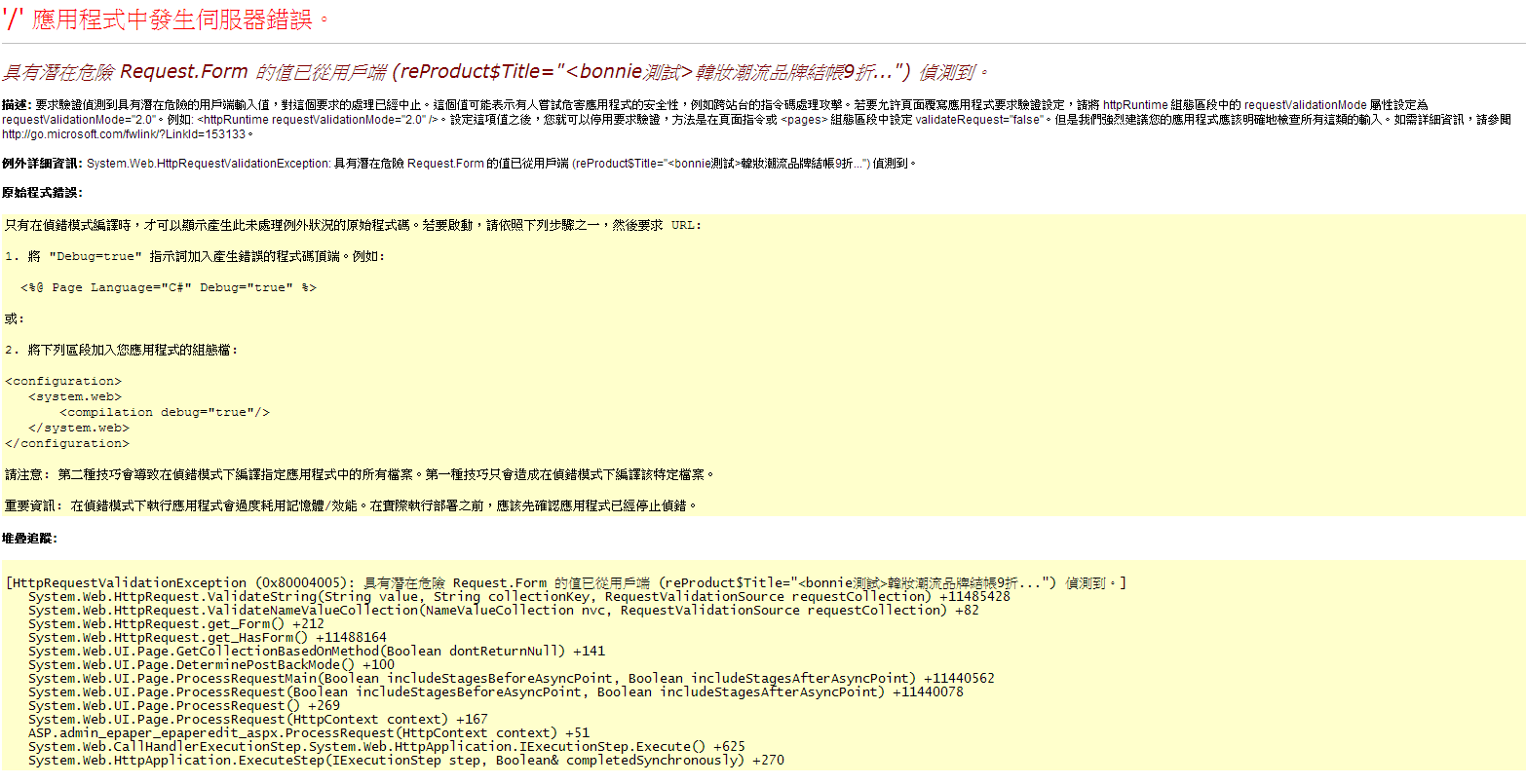搜尋 asp.net 結果:
請用系統管理員身分 開啟 cmd.exe
cd C:\Windows\Microsoft.Net\Framework\v2.0.50727
aspnet_regiis -pef "connectionStrings" "專案路徑"
aspnet_regiis -pef "appSettings" "專案路徑"
* 若出現 'aspnet_regiis' 不是內部或外部命令,可執行的程式或批次檔
先確認iis上專案的Framework版本
cd C:\Windows\Microsoft.Net\Framework\該版本的資料夾
若為v4.0.30319
cd C:\Windows\Microsoft.Net\Framework\v4.0.30319
應該就成功了
---------------------------------------
解密的部分
aspnet_regiis -pdf "connectionStrings" "專案路徑"
aspnet_regiis -pdf "appSettings" "專案路徑"
cd C:\Windows\Microsoft.Net\Framework\v2.0.50727
aspnet_regiis -pef "connectionStrings" "專案路徑"
aspnet_regiis -pef "appSettings" "專案路徑"
* 若出現 'aspnet_regiis' 不是內部或外部命令,可執行的程式或批次檔
先確認iis上專案的Framework版本
cd C:\Windows\Microsoft.Net\Framework\該版本的資料夾
若為v4.0.30319
cd C:\Windows\Microsoft.Net\Framework\v4.0.30319
應該就成功了
---------------------------------------
解密的部分
aspnet_regiis -pdf "connectionStrings" "專案路徑"
aspnet_regiis -pdf "appSettings" "專案路徑"
choco, 2019/5/24 下午 07:06:03
1. Asp.Net Session 會造成 Block
2. ashx 和 aspx 在 Session 的預設值是不同的.
3. Clinet 的非同步和 Session 造成的 block 的差異
4. 靜態物件也會互相等待(Browser concurrent connetion 的限制, Edge:8個 Connection, Chrome: 6 個, 2019/4 的測試)
5.ashx 和 aspx 的 session 閞關方式.
6. asp.net 的 session 是看 Cookie, 嘗試做 session hijack
額外追加: 服務的三個 Level(告知, 陪同完成, 詢問並給予進一步的建議)
2. ashx 和 aspx 在 Session 的預設值是不同的.
3. Clinet 的非同步和 Session 造成的 block 的差異
4. 靜態物件也會互相等待(Browser concurrent connetion 的限制, Edge:8個 Connection, Chrome: 6 個, 2019/4 的測試)
5.ashx 和 aspx 的 session 閞關方式.
6. asp.net 的 session 是看 Cookie, 嘗試做 session hijack
額外追加: 服務的三個 Level(告知, 陪同完成, 詢問並給予進一步的建議)
Bike, 2019/5/2 下午 02:41:33
由於早期網站都是VB.net寫的,若是直接換成 C#,就會耗費很多時間在轉換程式上
因此 ASP.NET 特別可以在同一網站同時寫 vb 跟 C#,方式是在 web.config compilation 加上設定
也就是 VB.NET 的 code 就放到 ~\APP_Code\VB_Code 目錄
C# 的 code 就放到 ~\APP_Code\CS_Code 目錄
這樣做有兩點要注意
1. Namespace 的命名,最好不要互相衝突, 要能夠區分出來
2. VB_Code 與 CS_Code 放的位置有很大的影響, 因為牽涉到 compiler的先後順序,因為 VB_Code 在 CS_Code 在前面,所以 CS_Code可以叫用 VB_Code下的程式,但是 VB_Code 卻不能叫用 CS_Code 的程式,如果希望 VB_Code可以叫用 CS_Code的程式,就把設定換過來
缺點就是反過來 CS_Code不能使用 VB_Code的程式
基本上,若是舊的程式碼都在VB_Code 那就把 VB_Code 放到前面
因此 ASP.NET 特別可以在同一網站同時寫 vb 跟 C#,方式是在 web.config compilation 加上設定
<compilation debug="true" defaultLanguage="c#" targetFramework="4.0">
<codeSubDirectories>
<add directoryName="VB_Code"/>
<add directoryName="CS_Code"/>
</codeSubDirectories>
</compilation>
也就是 VB.NET 的 code 就放到 ~\APP_Code\VB_Code 目錄
C# 的 code 就放到 ~\APP_Code\CS_Code 目錄
這樣做有兩點要注意
1. Namespace 的命名,最好不要互相衝突, 要能夠區分出來
2. VB_Code 與 CS_Code 放的位置有很大的影響, 因為牽涉到 compiler的先後順序,因為 VB_Code 在 CS_Code 在前面,所以 CS_Code可以叫用 VB_Code下的程式,但是 VB_Code 卻不能叫用 CS_Code 的程式,如果希望 VB_Code可以叫用 CS_Code的程式,就把設定換過來
<compilation debug="true" defaultLanguage="c#" targetFramework="4.0">
<codeSubDirectories>
<add directoryName="CS_Code"/>
<add directoryName="VB_Code"/>
</codeSubDirectories>
</compilation>
缺點就是反過來 CS_Code不能使用 VB_Code的程式
基本上,若是舊的程式碼都在VB_Code 那就把 VB_Code 放到前面
darren, 2017/5/10 下午 02:21:54
對於了解或設定 web.config 蠻有幫助的
http://weblogs.asp.net/jongalloway/10-things-asp-net-developers-should-know-about-web-config-inheritance-and-overrides
http://weblogs.asp.net/jongalloway/10-things-asp-net-developers-should-know-about-web-config-inheritance-and-overrides
darren, 2015/9/23 上午 11:49:47
這個問題與之前 reiko 提到的狀況是一樣的
http://blog.uwinfo.com.tw/auth/article/reiko/172
基本上就是 ASP.NET 無法辨別 IE11的UserAgent, 誤判他是別種瀏覽器造成
上此 hotfix 就可以解決
http://support.microsoft.com/kb/2836939
http://blog.uwinfo.com.tw/auth/article/reiko/172
基本上就是 ASP.NET 無法辨別 IE11的UserAgent, 誤判他是別種瀏覽器造成
上此 hotfix 就可以解決
http://support.microsoft.com/kb/2836939
darren, 2014/5/23 下午 06:42:17
今天設計反應新增電子報時發生問題

解決方式
1. 先確認 aspx => ValidateRequest="false
2. 上面如果設定對

解決方式
1. 先確認 aspx => ValidateRequest="false
2. 上面如果設定對
在Web.config中<system.web>中加入
這段 <httpRuntime requestValidationMode="2.0" />就ok了!!!
造成的原因
是.NET 4.0跟2.0版本在請求驗證的定義不同:
ASP.NET Request Validation 請求驗證是ASP.NET提供來保護XSS攻擊的一項功能
在2.0 僅針對.aspx及class進行驗證…
但到了4.0,請求驗認範圍擴大到所有的請求…
而不是只有.aspx,還包含WebService呼叫以及自訂的http Handlers,都會去驗證http請求的內容…
Vicky, 2014/5/19 上午 11:24:52
假如你現在在ASP.NET 4.0 的環境下的話,就算進行上述的設定,可能仍會出現驗證失敗的訊息(潛在危險Request.QueryString的錯誤訊息)
因為ASP.NET4.0與2.0版本在請求驗證的定義上已經有所不同:
這時為了避免這樣的問題,一樣在Web.Config中 <system.web>下加入下列語句
<httpRuntime requestValidationMode="2.0" />
http://www.dotblogs.com.tw/pin0513/archive/2010/10/22/18522.aspx
因為ASP.NET4.0與2.0版本在請求驗證的定義上已經有所不同:
這時為了避免這樣的問題,一樣在Web.Config中 <system.web>下加入下列語句
<httpRuntime requestValidationMode="2.0" />
http://www.dotblogs.com.tw/pin0513/archive/2010/10/22/18522.aspx
Doug, 2014/3/28 下午 05:35:11
問題情形:.NET 4.0在遇到IE11時,會將Style的width拿掉
參考:http://forums.asp.net/t/1934887.aspx
解決方法:安裝更新 KB2836939 下載
參考:http://forums.asp.net/t/1934887.aspx
解決方法:安裝更新 KB2836939 下載
Reiko, 2013/12/4 下午 12:18:12
ASP.NET程式開發時,有時候會寫資料到cookies
這時我們會用 Response.Cookies.Add 寫入
但是大家都會忽略到一種情況,如果後面程式也會使用到該cookies時
Request.Cookies 會抓不到剛設定的cookies
這時就要 Request.Cookies.Set 來設定 Request 值
錯誤示範:
Page_Load --> Response.Cookies.Add a Cookie named "test"
Page_PreRender --> Request.Cookies("test") --> Nothing
正確示範(同時寫兩行):
Page_Load --> Response.Cookies.Add a Cookie named "test"
Request.Cookies.Set a Cookie named "test"
Page_PreRender --> Request.Cookies("test") --> Got it!
這時我們會用 Response.Cookies.Add 寫入
但是大家都會忽略到一種情況,如果後面程式也會使用到該cookies時
Request.Cookies 會抓不到剛設定的cookies
這時就要 Request.Cookies.Set 來設定 Request 值
錯誤示範:
Page_Load --> Response.Cookies.Add a Cookie named "test"
Page_PreRender --> Request.Cookies("test") --> Nothing
正確示範(同時寫兩行):
Page_Load --> Response.Cookies.Add a Cookie named "test"
Request.Cookies.Set a Cookie named "test"
Page_PreRender --> Request.Cookies("test") --> Got it!
darren, 2013/11/4 下午 06:37:03

ASP.NET 在處理 HTTP POST 要求時最多只能接受 1,000 個參數,一般來說不會有人透過 POST 傳遞表單資料超過 1,000 個欄位 ( 以筆者的經驗來說,傳過最多的一次是 700 個欄位,當時是個問卷系統 ),如果傳數參數超過 1,000 筆的話,就會出現 Operation is not valid due to the current state of the object. (英文) 或 由於該物件目前的狀態,導致作業無效。 (中文) 例外狀況,細部的例外訊息會有 HttpException (0x80004005): The URL-encoded form data is not valid. (英文) 或 HttpException (0x80004005): URL 編碼型式資料無效。
參考:http://blog.miniasp.com/post/2012/01/01/Efficient-Denial-of-Service-Attacks-on-Web-Application-Platforms.aspx
解:
web.config加下面這個設定
<appSettings>
<add key="aspnet:MaxHttpCollectionKeys" value="5000" />
</appSettings>
Reiko, 2012/8/15 下午 06:39:13